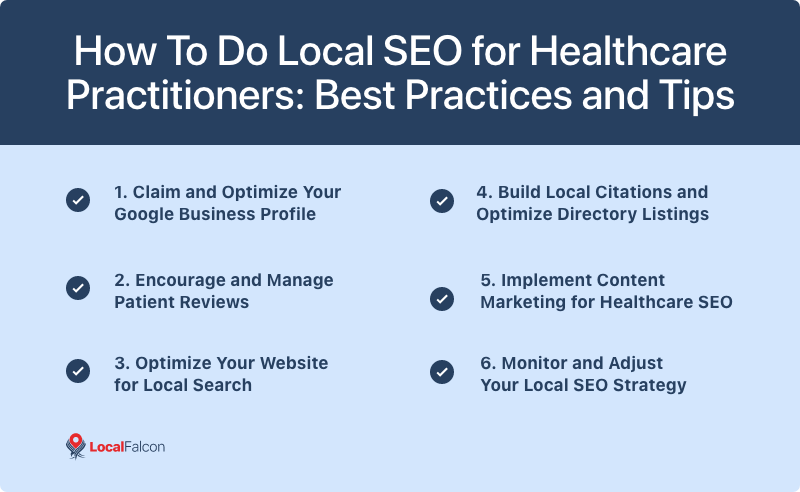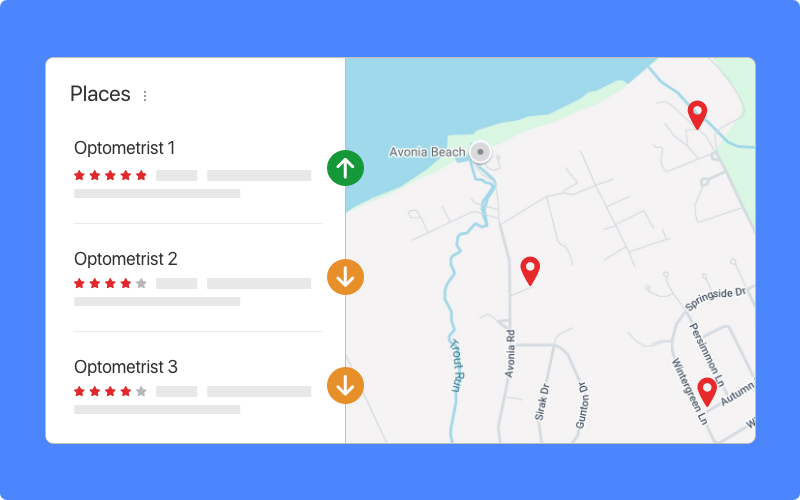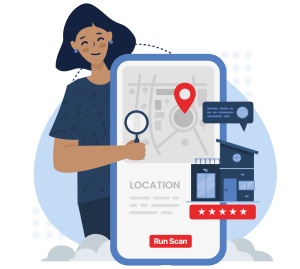Healthcare industry businesses rely more than ever on local search to attract new patients, making local search engine optimization a top priority for healthcare practitioners of all types.
From general practitioners and family doctors to mental health doctors and other specialists, healthcare professionals must implement local SEO strategies in order to ensure their practices are easily found online.
Local SEO for healthcare providers focuses on improving your visibility in search engine results when potential patients search for relevant services in your area. In this sense, local SEO for healthcare professionals is similar in many ways to local SEO for other types of local businesses.
However, due to the specialized and sensitive nature of healthcare services, there are also certain aspects of local SEO for healthcare providers that make it unique.

What Is Local SEO for Healthcare Professionals?
Local SEO for healthcare is the process of improving a medical practice's visibility in local search results to attract nearby patients actively seeking care.
For most businesses, the primary goal of local SEO is to appear at the top of Google Search results, in what's known as Google's local pack, as well as to appear prominently on Google Maps. These are where the vast majority of local searches occur.
This process revolves around several key elements, including optimizing your Google Business Profile, ensuring consistent local citations across relevant directories, gathering patient reviews, and making sure your website is optimized with local keywords and location-specific content.
When done correctly, local SEO helps your practice stand out, boosts your credibility, and ensures you're visible to local patients when they need you most.
How Is Doing Local SEO for Healthcare Providers Unique?
While the principles of local SEO are similar across industries, doing local SEO for healthcare professionals comes with its own unique set of challenges and opportunities.
One major difference is the need to adhere to healthcare industry regulations, such as HIPAA, when handling patient information and reviews. Healthcare providers must be particularly mindful of protecting patient privacy when requesting feedback and responding to reviews.
Another unique aspect of doing local SEO for healthcare practitioners is the critical importance of building trust; patients are not just customers, they're placing their health in your hands, so your online reputation is especially important.
More so than in other industries, patients are likely to look at industry-specific review sites beyond Google Business Profile before choosing a healthcare provider.
Because of this, healthcare professionals can benefit greatly from building citations and optimizing listings on healthcare-specific directories and review sites, which not only help improve local SEO, but also serve as additional platforms for patients to find and connect with their providers.
Additionally, patients are typically searching for highly specific, location-based medical services. For instance, they might be searching for "cardiologist near me" or "walk-in clinic in [City]." This makes it crucial for healthcare professionals to rank well for local, service-related keywords that are relevant to all the different services and amenities they provide.
That being said, people may be willing to travel a bit further to receive the medical care they need than they would be to, say, purchase something from a retail store or eat at a restaurant, meaning geo-targeting for healthcare providers may tend to be a little broader than for other types of businesses. In other words, you may want to try and rank for specific search terms further afield.
Should Healthcare Practices Do Local SEO In-House or Hire an Agency?
Local SEO for healthcare practices can technically be handled in-house, but it often becomes more complex and time-consuming than many providers expect.
Between managing Google Business Profile updates, monitoring and responding to patient reviews in a HIPAA-compliant way, keeping citations accurate across healthcare directories, and producing location-specific content, local SEO requires ongoing attention and specialized knowledge.
For smaller practices or solo practitioners, handling the basics internally may be enough to establish a presence in local search results. However, as competition increases, or for multi-location practices, local SEO quickly becomes more technical and resource-intensive.
This is where working with a local SEO agency that understands the healthcare industry can be beneficial. A healthcare-focused SEO provider can help ensure compliance, scale optimizations across locations, track performance at a hyperlocal level, and continuously adapt your strategy as search algorithms and patient behavior change.
Many healthcare practices find that combining internal involvement with external SEO expertise allows them to maintain visibility, protect their reputation, and consistently attract new patients through local search.
How To Do Local SEO for Healthcare Practitioners: Best Practices and Tips

1. Claim and Optimize Your Google Business Profile
No matter what type of business you're doing local SEO for, claiming and optimizing your Google Business Profile is the most important first step to take. This free tool allows healthcare professionals to manage their presence across Google Search and Maps.
Start by claiming your GBP listing, if you haven't already, then make sure your profile is fully optimized by choosing the most relevant primary and secondary categories and providing accurate business details, such as your address, phone number, hours, and a detailed description of your practice and services.
Next, upload a few high-quality images of your facility. You can also take advantage of other Google Business Profile features to boost engagement and highlight your services, ultimately helping you get more leads. For example, use Google Business Profile Posts to promote specific services or aspects of your practice.
You may also want to consider adding a direct booking link to your GBP, making it easier for patients to book appointments and reducing the volume of phone calls, messages, and emails.
2. Encourage and Manage Patient Reviews
Patient reviews play a significant role in local search rankings and in building trust with potential patients.
Encourage satisfied patients to leave positive reviews on Google Business Profile and other healthcare-specific review platforms like Healthgrades or Vitals.
Keep in mind that it's very important to ensure compliance with HIPAA regulations by not soliciting reviews in exchange for incentives and ensuring that patient information remains confidential in responses.
You should also engage with your reviews by thanking patients for positive feedback and addressing any concerns raised in negative reviews. Always respond professionally and never disclose any personal health information when addressing complaints online.
Additionally, make sure to conduct review analysis to analyze patient sentiment and identify areas for improvement. Ultimately, this can help you get more positive reviews and improve your local SEO over time.
3. Optimize Your Website for Local Search
Your website is an important online hub where patients can find more in-depth information about your medical practice, and as such it needs to be optimized for local search as well.
Ensure that your site is mobile-friendly, fast-loading, and easy to navigate, as these factors influence both user experience and search engine rankings.
Incorporate location-based keywords into your website's content, including service pages, blogs, and meta descriptions. If your healthcare practice has multiple locations, create dedicated location pages for each one.
Lastly, Consider implementing local schema markup on your website, which helps search engines better understand your business's location and services.
4. Build Local Citations and Optimize Directory Listings
Local citations, or mentions of your practice's name, address, phone number (NAP) and other key info on relevant third-party websites, are essential for local SEO.
Consistency is key here, meaning your NAP information should be as close to identical as possible across all online platforms, including industry-specific directories like Zocdoc, Healthgrades, and others, as well as broader listing sites and navigation platforms, like Google Maps, Apple Maps, and Yelp.
To streamline the process of managing your citations, consider using local listing management tools and implementing regular local citation audits to help you monitor and update your practice's information across multiple directories. Inaccurate information, such as old addresses or incorrect phone numbers, can harm your local SEO efforts and confuse potential patients, resulting in lost leads.
5. Implement Content Marketing for Healthcare SEO
Content marketing is a powerful tool for SEO, especially in the healthcare industry, since potential patients often conduct informational searches before deciding to visit a healthcare provider.
Having content that appears in relevant searches can direct people to your site when they're conducting research, increasing the chances of them choosing your practice when they're ready for an appointment.
Focus on creating blog posts, articles, and other content relevant to your local audience that address common healthcare questions or concerns.
For example, if your practice is located in an area that experiences harsh winters, you might write about cold-weather health tips or ways to prevent seasonal illnesses. One of the tips you include could be getting a seasonal flu shot. Then, when people come across the article on your site, they may make an appointment for a flu shot at your clinic.
By regularly publishing valuable, location-specific content that's relevant to the healthcare services you provide, you can increase your website's authority and relevance to search engines, which in turn will help boost your local SEO rankings.
6. Monitor and Optimize for AI Search Visibility
Local search is no longer limited to traditional Google results. Patients are increasingly discovering healthcare providers through AI-powered search experiences, including Google AI Overviews and conversational search tools that surface local business recommendations.
For healthcare practices, this makes AI visibility an important extension of local SEO. AI systems often rely on the same foundational signals, including accurate business information, strong reviews, consistent citations, and authoritative local content, but they interpret and surface that data differently than traditional search results.
To improve AI search visibility, healthcare providers should ensure their practice information is clear, consistent, and well-distributed across trusted sources, including Google Business Profile, healthcare directories and review sites, and their own website. High-quality content that clearly explains services, locations, and specialties also helps AI systems understand when and where to recommend your practice.
Because AI-driven search results can vary by location, monitoring visibility at a hyperlocal level is especially important. Using tools (like Local Falcon) that track how your practice appears across different AI search experiences can help identify gaps, measure performance, and guide optimizations that support both traditional local rankings and emerging AI search results.
As AI continues to shape how patients find healthcare providers online, incorporating AI visibility into your local SEO strategy helps ensure your practice remains discoverable, both now and in the future.
7. Monitor and Adjust Your Local SEO Strategy
Local SEO is not a one-time effort, but rather an ongoing process that requires consistent monitoring and adjustments to remain competitive.
Using the right local SEO tools, like Local Falcon's AI-integrated geo-grid rank tracker, can help you visualize how your practice ranks across different locations within your city or region. This allows you to track your progress at a hyperlocal level and implement optimizations to outrank competitors and attract more patients at specific points on the map.
Make sure to also monitor your website's performance through analytics tools to see how local patients are finding and interacting with your site. Make adjustments to your on-page SEO and content strategies accordingly to help boost your site's performance and generate more leads through organic local search results.
You may want to consider hiring an SEO agency to help with all of this, especially if your healthcare practice doesn't employ any in-house SEO experts.

FAQs About Local SEO for Healthcare Practices
Is local SEO worth it for healthcare providers?
Yes. Local SEO helps practices appear in high-intent searches from patients actively looking for nearby medical services.
How long does local SEO take to work for medical practices?
Most practices see improvements within three to six months, depending on competition and current online visibility.
Can healthcare practices do local SEO themselves?
Basic tasks can be done in-house, but advanced optimization, tracking, and scaling usually require specialized tools and expertise.
What makes local SEO for healthcare different?
Healthcare SEO requires added focus on trust, reputation, and patient privacy, including HIPAA-compliant review management.
Wrapping Up
For healthcare practitioners, implementing a strong local SEO strategy is essential for getting found by potential patients in a specific area.
By following the tips and best practices we've outlined above, you can build trust with search engines and potential patients alike, increasing your visibility in local search results and driving more business to your practice.


